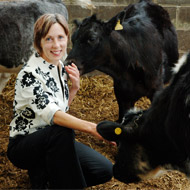Radio series to explore animal sentience

Christine Nicol, professor of animal welfare at the University of Bristol's School of Veterinary Sciences.
A new series on BBC Radio 4 is set to explore the challenging subject of animal sentience and welfare.
Starting on Wednesday (9 December), the four-part series will explore the question of whether animals have the ability to feel and the potential consequences of accepting that some animals are conscious, sentient creatures.
Hosted by Christine Nicol, professor of animal welfare at the University of Bristol's School of Veterinary Sciences, the series entitled 'Would you eat an alien' includes interviews with animal welfare scientists, wildlife biologists, and philosophers.
To help consider the subject, comedian and vegan Jake Yapp will play the part of a sensitive spaceman who has crash-landed on a remote planet. Jake doesn't have much food to keep him alive until he is rescued, but fortunately the planet is brimming with edible alien life forms.
Jake wants to cause the minimum amount of pain and distress to the creatures, so he needs to know whether they can feel pain, and how he can minimise suffering.
However, as he discusses his dilemma with Professor Nicol, other questions will emerge. Will eating one alien cause distress to others? Do some types of alien creatures have such a degree of self-awareness that Jake needs to consider whether they are non-human persons? And how does his growing fondness for one particular individual affect his ultimate decision?
Commenting on the series, Professor Nicol said: "In this series, the biology of the alien creatures is central, and the different concerns of sentient animals, socially bonded animals, and animals with some awareness of their own future are exposed for debate."
'Would you eat an alien' will be broadcast on BBC Radio 4 at 9pm on Wednesday, 9 December.



 The latest
The latest